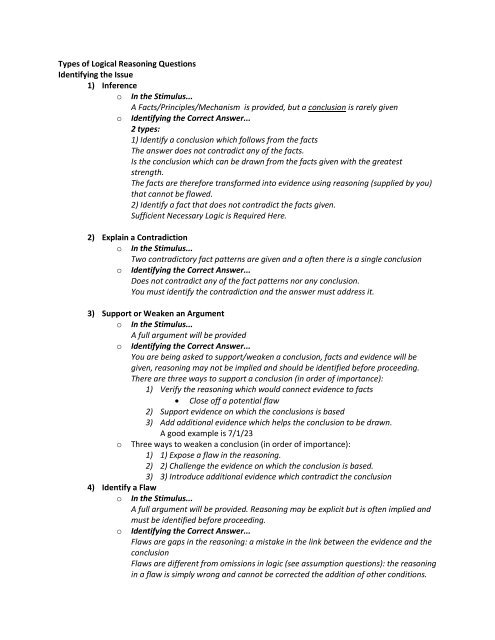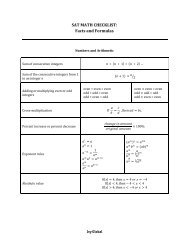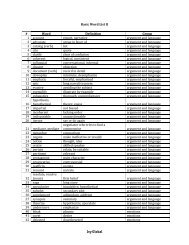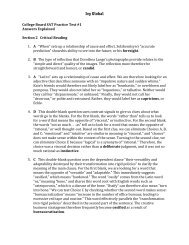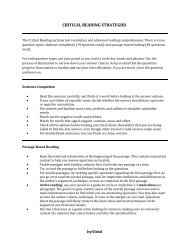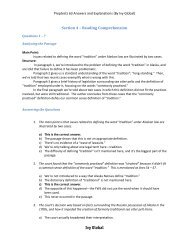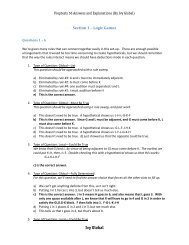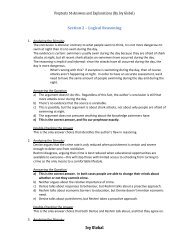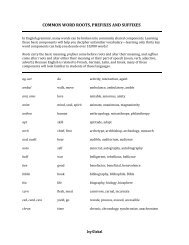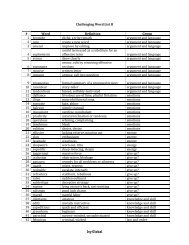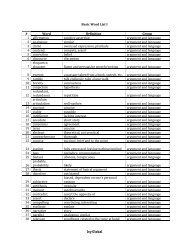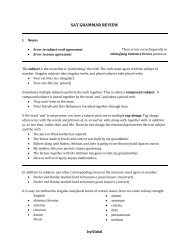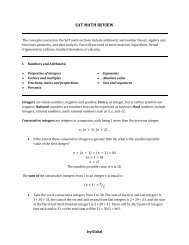Types of Logical Reasoning Questions Identifying the ... - Ivy Global
Types of Logical Reasoning Questions Identifying the ... - Ivy Global
Types of Logical Reasoning Questions Identifying the ... - Ivy Global
Create successful ePaper yourself
Turn your PDF publications into a flip-book with our unique Google optimized e-Paper software.
The answer will not attack <strong>the</strong> evidence, but will point to <strong>the</strong> logic employed: how is<strong>the</strong> evidence incorrectly connected to <strong>the</strong> conclusion.With formal logic, <strong>the</strong> flaw is easier to identifyWith informal logic, try to think <strong>of</strong> a situation where <strong>the</strong> conclusion does notapply.Common flaws.Also, if <strong>the</strong> evidence is uncertain and limited in scope but <strong>the</strong> conclusion isdecisive and wide in scope, eyebrows should be raised.The test is: Does this answer stop <strong>the</strong> conclusion from being properly drawn?Identify <strong>the</strong> Conclusiono In <strong>the</strong> Stimulus...A full argument will usually be provided.o <strong>Identifying</strong> <strong>the</strong> Correct Answer...All <strong>of</strong> <strong>the</strong> evidence will point toward <strong>the</strong> conclusion.Conclusions are <strong>the</strong> point that <strong>the</strong> author is arguing for; For example, a principlecould function as both evidence or a conclusion.5) Identify required assumptionso In <strong>the</strong> Stimulus...A full argument will be provided.There are two 2 types <strong>of</strong> this kind <strong>of</strong> question:1) Fill in <strong>the</strong> blanks:The conclusion will fail to link <strong>the</strong> evidence to <strong>the</strong> conclusion.Often a mechanism will be given, but not all <strong>of</strong> <strong>the</strong> parts will be mentionedby <strong>the</strong> conclusionEg) 60/1/72) What if...: The conclusion will not be outright incorrect, but incomplete. TheConclusion will <strong>of</strong>ten be wider in scope, or more decisive than <strong>the</strong>evidence would allow. Eliminating Alternatives: It helps to find a situation where <strong>the</strong>conclusion may not apply. The conclusion <strong>the</strong>refore cannot bedrawn conclusively unless an assumption which covers thatsituation is made. Very <strong>of</strong>ten has to do with eliminating confounding or interveningvariablesEg) 60/3//3o The ‘Negation Technique ’<strong>of</strong> answer will help eliminate <strong>the</strong> answer choice since <strong>the</strong>assumption is REQUIRED for <strong>the</strong> conclusion to be drawn conclusively.8) Parallel <strong>Reasoning</strong> In <strong>the</strong> Stimulus...A conclusion and evidence will be given; <strong>of</strong>ten <strong>the</strong> reasoning will be stated explicit\ <strong>Identifying</strong> <strong>the</strong> Correct Answer...Tips:1. Valid/Invalid – if <strong>the</strong> stimulus conclusion is valid (no flaws), <strong>the</strong>n anyanswers which with invalid conclusions can be eliminated2. Parallel Scope– if <strong>the</strong> stimulus conclusion is a general principle, <strong>the</strong>answer’s conclusion will also be a general principle; if <strong>the</strong> stimulus
evidence is an example, <strong>the</strong> answer’s evidence will also be an example9) Disagree Over In <strong>the</strong> Stimulus...i. Two conclusions will be given (recall conclusions can be recommendations,explanations, etc.) are given by two speakers. <strong>Identifying</strong> <strong>the</strong> Correct Answer...i. Identify <strong>the</strong> two conclusions. These conclusions will take opposing sides to <strong>the</strong>some issue.ii. That issue will <strong>the</strong>refore be addressed by both conclusions


